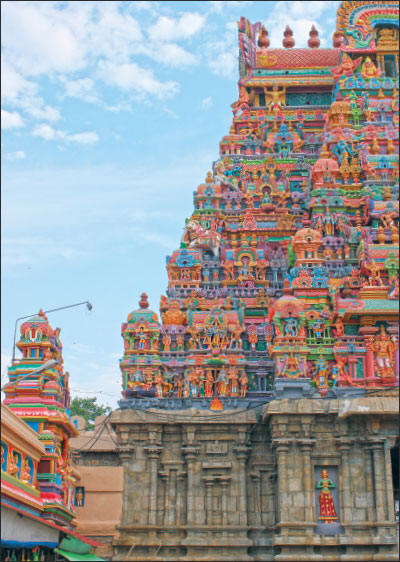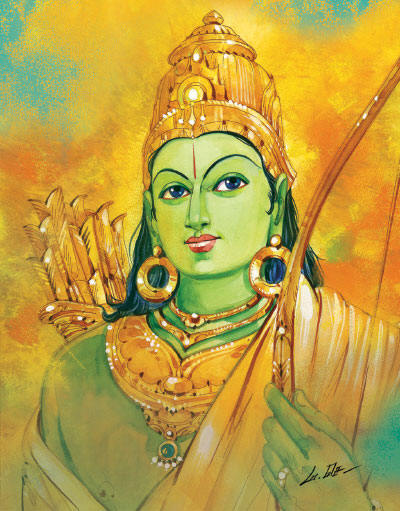Author: Indira Soundarrajan
Revised Nov 12, 2018
Thin dark clouds coalesced like a Pandal in the sky. Garuda flew in with the Praṇavākāra Vimāṉam on his back. Brahma is riding on the back of the swan in a sitting pose heading towards Sarayu riverbank.
Ikṣvāku is in Tapas. In a fleeting moment, there appears before him a Maṇimandapam (a square flat-roofed pavilion decorated with gems.) There is a floral platform. Srīgarudaṉ placed the Praṇavākāra Vimāṉam on it. Brahma dismounts from the swan appears before Ikṣvāku and commands him to open his eyes. Ikṣvāku, opening his eyes, witnesses Praṇavākāra Vimāṇam first and Brahma later. He falls prostrate at Brahma’s feet.
At that moment, Vasiṣtar, Ṛṣis, Vivasvān, and others come there making Ayodhya Bhūlōka Vaikuṇṭam.

Emperumāṉ’s compassion and grace are freely available for all irrespective of who thinks or does not think of him. Running stream of water has one purpose: Quench the thirst. Water does not discriminate between man and beast. Likewise, Emperumāṉ without an iota of discrimination showers on the earth dwellers his grace and compassion. This gesture is Satyam. You live long! Long live Your ruler, his subjects and others. Having blessed the people and paying his homage to the Vimāṇam, Brahma takes leave.
Vivasvān, the seventh Manu comes rushing in and embraces his son with joy. He says to Ikṣvāku, “Because of you, a great a Rāja Parampara will come into existence. It will acquire the name, Surya Vamsam (Sun race or lineage). Emperumāṉ may take birth in this Vamsam as an Avatar. All will realize my predictions as a chronicler in time. At that time, your name, with my name as your beneficiary will be on record on this earth. With your Bakthi, you were able to accomplish all these. He shed tears saying, “I am proud of you and your achievements.”
Ikṣvāku dedicated his excellent name to Vasiṣtar and worshipped Praṇavākāra Vimana Araṅganātha Peruman by paying homage six times a day. As the wheel of time was spinning, his sons adored Peruman, who became the sole family deity of the royal family.
Is it for that purpose did the Praṇavākāra Vimāṉam come down to earth from the heavens? Is not the Vimāṉam common to all life forms? A shared entity: should it not be available for all? That day came in the person of Dharmavarma, the Chola Sāmrājjiyāthipathi.
In Ayodhya, Dasaratha’s reign in the lineage of Ikṣvāku. Though he had three wives in the place of one, Dasaratha had no children. He was heart-broken on this account. When something is available, there is no appreciation of its essential value. When it is not available, nothing looks more significant or necessary.
Dasaratha had a child on his mind all the time. He was discouraged and heartbroken to think of disappearance of Raghukulam in the world and destruction of Ayodhya from lack of progeny. Dasaratha was grief-stricken as he narrated his predicament to Vasiṣtar, his guide and Raja Guru.
.
Dasaratha: “My dear Guru: You are the Brahmaṛṣi who has won over old age and guide this family. Why is it I don’t have the blessing to have a child? He cried saying, will my race end with my death?
• Vasiṣtar: “Dasaratha! You take your wives to Tamasā on the Sarayu Riverside, wherein the temple you pay homage and supplicate to is Praṇavākāra Perumāḷ. On your return, we will discuss this further.” Saying this, Vasiṣtar sent Dasaratha and his three wives to the Perumāḷ temple. The Sarayu river roared from the new rainwater. There was no dearth in the three seasonal rains. There was verdant scenery at every turn.
Dasaratha rode on a four-horse chariot on the streets of Ayodhya city. The subjects moved out of the way and greeted him, “Long live great king … Long live Ravikula eminence.”

Those street scenes helped him evaluate his rein and popularity with the subjects. ‘Everyone is doing well. There is unity among the subjects. There is no problem with my reign. Despite all these good tidings, what is the reason I have no children?’
With that question on his mind, he stood before Praṇavākāra Perumal in the temple on the riverside. There was a flood of tears in his eyes. The sanctum Vedic Brahmana saw this. When he gave Dasaratha the Prasāda (Sacrament), he said, “My King, mental distress even for you.”
Dasaratha: “Yes, Vaidīkar (Vedic Scholar; priest)! I am afraid I am a mere man (unable to sire a child). Only when my Vamsam flourishes (and I have a progeny), my Kulam will have a future. If my Kulam ends with me, won’t it mean I am a disabled person.”
The priest: “My king! Do you show grief in the Sanctum of Perumal? Perumal went from Vaikuntam to Satyalokam and then to our Bhūlokam, particularly by Sarayu Riverbank. Won’t he confer grace to you at least to safeguard his honor and reputation?
Priest: If Perumal does not give you grace, won’t this sanctum become dark and dingy? Since Perumal has come down to illumine himself and others, would you really worry?”
Dasaratha: All you say is true! However, time is ticking and rolling fast. No child in sight.”
Priest: There is a season for the seeds to sprout. In your case, there may be a time and place. One of your ancestors received Perumal in the form of an idol. Is it impossible that you may get a baby?
Dasaratha: Let your words come true. Let your words become golden words. I will perform ablution with a thousand gold coins.” At that moment, a wall lizard from inside the Sanctum sanctorum gave a sound as if it was an assent and an acceptance (from Perumal).
Dasaratha and his three wives were ecstatic. Upon his return, Dasaratha informed Vasiṣtar about the lizard incident. That put a smile on his face.
Vasiṣtar: Dasaratha. “The day to shed your mental distress has arrived. I ordered you to go to the temple so you will discover the subtle signs. You have come to know of the signs. Your next royal duty is Yagna: Putrakāmeṣti Yagnam. Once Yagna is complete, the time delay and obstruction will dissipate and your ability to father children will fructify. I have no doubts about it. In anticipation, you must perform Aśvamēdha Yāgam as a tool for the removal of all faults. Let us send invitations to all the kings of the world. Let them all come to Ayodhya to participate in the Yāgam. Because of it, there will be an accumulation of Yāga accouterments on one side. On the other side, the whole world on its behalf will benefit from the meritorious act.”
Vasiṣtar’s desire was bearing fruits. Ayodhya’s emissaries took the news to all parts of the world. One emissary stood before Dharmavarma, the ruler of the Chola country and informed him of the Yagnam of Dasaratha. Dharmavarma thought he could go north on a pilgrimage.
This fire sacrifice will take place before Prāvākāra Perumal of Vaikuntam now abiding in a temple in Bhuloka. Emperumal's presence here is a rare opportunity for the kings to obtain his Darśan. The news in the royal invitation that it is a ‘rare opportunity’ encouraged Dharmavarma to participate in the sacrifice.
Immediately, he gave his answer of acceptance of an invitation to the emissary.
Dharmavarman: I am sure I will participate in this fire sacrifice. We will bring with us one hundred vessels of Kaveri water, great homegrown bananas, betel leaves, and mountain honey. Hearing this, the emissary was joyous and left for home.
When Dharmavarma reached Ayodhya, he saw the city in a celebratory mood with extravaganza. The high officials of the court received Dharmavarma. He stayed in the cottage by the Sarayu river specially built for kings. He saw the Praṇavākāra Perumal’s temple’s tall tower. Upon seeing the Temple and Perumal, Dharmavarman had the same reaction that Ikṣvāku had. His mind dared to perform Tapas as Ikṣvāku and bring the temple to Chola country. 153-255-153